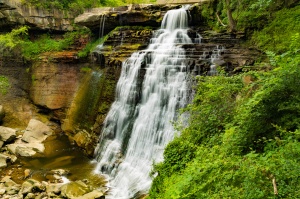The Power of Awe
My husband asked me if I wanted to watch this movie, Operation: Arctic Cure. He knows I love stories about people who face hardship. Sometimes they triumph. Sometimes they fail. But they’re always out there trying. Dan also knows that I like stories of Arctic adventure—mountain climbers, exploration ships, races to the pole, and the like. So he figured the movie would be perfect for me. And it was.
It was a documentary telling the story of a handful of people cross-country skiing across Baffin Island, Canada, to reach Mount Thor, pictured above. What made this expedition different was that the participants were all people who had been injured in the wars in Afghanistan and Iraq. Most were soldiers, but one was a news correspondent who had been caught in an IED explosion and suffered traumatic brain injury (TBI). The other people on the expedition also had TBI or amputated limbs. And PTSD.
The people who conceived the expedition were hoping that the experience would somehow help them alleviate the PTSD. The teamwork, the effort, the hardships for a cause were all hoped to be therapeutic.
Another inspiration for the trek was Dacher Keltner’s book Awe. In it, the researcher on emotions posited that encounters with the wonders of nature could have beneficial effects on the brain and body. These outcomes would be largely self-reported, of course, but were backed up by scientific data. The participants took their cortisol levels, a measure of stress hormones, before the trip and twice a day during it. They also had sensors that recorded the length and quality of their sleep. And they kept video diaries, with their faces computer-analyzed for symptoms of stress through eye movement and changes in facial expression.
They did indeed encounter hardships. The skiers pulled heavy loads of their gear behind them. There was the numbing cold, vicious winds that held up their travel, and one amputee whose prosthetic caused so much pain that for one day she couldn’t walk. One of the men pulled her along with his own pack so she could stay with the expedition until she was able to adjust her foot the next day. They talked, of course, sharing stories of their war experiences and their families. One participant came to realize that he hadn’t been in touch with people he knew during the war and that he needed to be.
Where did Keltner’s book fit in? It proposed that the experience of awe, perhaps best encountered in nature, had healing properties. The expedition certainly had those awe-some experiences. They were far enough north to see huge displays of the Northern Lights. They conquered milestones such as reaching the Arctic Circle. And they made it to the foot of Mount Thor, a rugged landscape that features the world’s highest vertical cliff.
But those were subjective experiences. Was there science to back up Keltner’s claim and to validate the emotions described by the participants?
The measures of cortisol provided interesting feedback. In normal individuals, cortisol levels start high in the morning and decline through the day, leaving the body ready for peaceful sleep at night. The participants started the journey with cortisol levels significantly lower than average and rapidly declining throughout the day. By the end of the trek, their cortisol levels approached normal. And their sleep quality and length improved as well. One participant had a 40% increase in his sleep stats.
The movie followed the injured warriors during their trek, but not afterward, so it’s unclear whether the gains lasted. But they evidently experienced something profound. They spoke of the clarity from being in nature and the feeling of being a part of the world around them.
Many books and articles on self-care recommend being out in nature. Most of them talk about the benefits of sunlight, motion, and exercise. Keltner’s book and the film suggest a broader effect. The feeling of awe, of being one with the natural world, could increase a person’s peace, happiness, and a deeper connection to other human beings.
It was pointed out that you don’t have to travel to extreme environments to experience this awe. It’s all around us, if only our eyes are opened to it.




Recent Comments